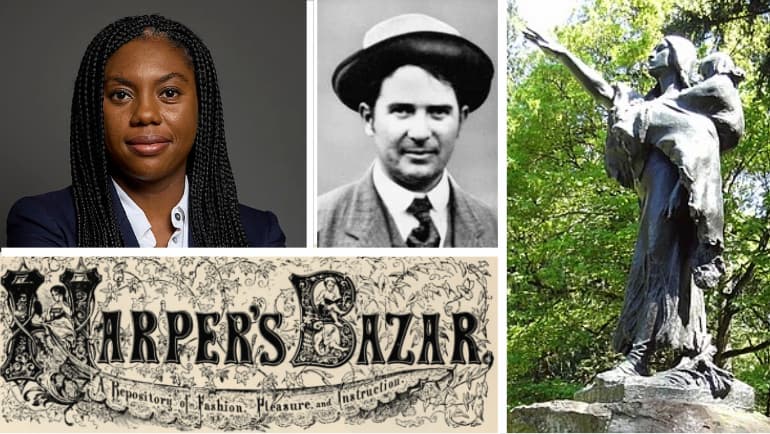Check out This Day in History for Nov. 2, MainStream’s daily look at significant progressive, intersectional historical events.
1648: In yet another historical moment where Jews became collateral damage for tension between other ethnic groups, the Slavic warrior Cossacks massacred 6,000 Jews in the community of Nemirov, as part of their uprising against the Polish nobility, after tricking the townspeople by flying Polish flags. The Cossacks, who had protected the Polish nobility from the invading Tatars, rose up in response to new laws that restricted the Cossacks’ power. This attack triggered a decade of the Chmielnicki Massacres, named after the Cossack leader Bogdan Chmielnicki, which ended two centuries of Jews’ peaceful coexistence with Christians in Poland.

Above, from top left; Kemi Badenoch, the first Black female leader of a major political party in Britain; Johnny Campbell, the accidental inventor of cheerleading; a statue of Sacagawea; and the early logo of Harper’s Bazaar, founded in 1867.
1804: Sacagawea, a 17-year-old Shoshone woman, guides Meriwither Lewis and William Clark through the Northwest United States and becomes legendary in American history for her help in finding edibles during the journey, recognizing landmarks, and translating with other Indian tribes.
1867: Women’s fashion magazine “Harper’s Bazaar,” which would eventually become one of the largest women’s magazines in history, is published for the first time. It continues to publish today, with an estimated readership of just over 740,000.
1898: “Rah, Rah, Rah! Sku-u-mar, Hoo-Rah! Hoo-Rah! Varsity! Varsity! Varsity, Minn-e-So-Tah!” Those were the words of University of Minnesota fan Johnny Campbell, considered the accidental founder of modern-day cheerleading. Cheerleading would initially thrive as an elite male pursuit before becoming associated with women in the 1930s.
1917: The Balfour Declaration triggers a new era of strife in the Middle East, when Great Britain declares its goal of establishing a Jewish home state in Palestine. The declaration clashed with promises Britain had already made to France and to Arabs regarding Palestine, which it governed as part of the League of Nations‘ effort to establish peace in the region following World War I. One historian described the declaration as “made by a European power … about a non-European territory … in a flat disregard of both the presence and wishes of the native majority resident in that territory.”
1920: The American electorate grew by 26 million, or 30 percent, in this first presidential election in which women could vote.
1920: In what’s considered “the largest incident of voting-day violence in United States history,” the Ocoee Massacre led to the killings of an estimated 30 to 80 Blacks by a white mob when citrus grove owner Mose Norman asserts his right to vote in his hometown of Ocoee, a community just west of Orlando, Fl., originally founded by former slaves.
1969: The first-ever gay pride event is proposed by three gay community leaders in New York City at a meeting of the Eastern Regional Conference of Homophile Organizations (ERCHO). The trio proposed a Christopher Street Liberation Day, to be held annually on the last Saturday, to commemorate the 1969 spontaneous demonstrations on Christopher Street at the Stonewall Inn. The group also committed to inviting “homophile” organizations nationwide to honor the day.
1988: The first major cyber-attack in history occurs four years before the invention of the worldwide web. Known as the Morris worm, the self-replicating code contaminant shut down automatically shut down 6,000 of the 60,000 computers linked to the internet at that time. The FBI discovered the worm had been created by Cornell graduate student Robert Tappan Morris.
2017: Jerome Powell is nominated by U.S. President Donald Trump to lead the Federal Reserve. Considered a “status quo” pick at the time, Powell has become one of Trump’s nemeses this year because of his refusal to lower interest rates in order to offset the imapct of Trump’s chaotic tariff policies.
2024: Kemi Badenoch becomes the first black woman to lead a major British political party when she is elected leader of the Conservative Party, by a vote of 53,806 to rival Robert Jenrick’s 41,388. Badenoch is considered to be at the “right edge of her center-right party.”
Photos courtesy Wikimedia Commons

